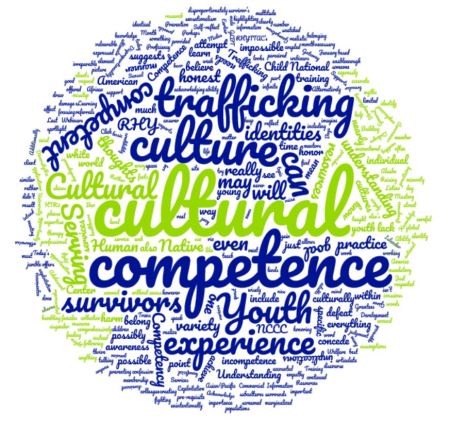Cultural Competence and Meeting the Needs of Human Trafficking Survivors
Written by: Lindsey Collier, Human Trafficking Specialist, National Safe Place Network & RHYTTAC
January is National Human Trafficking Awareness Month. Our goal is to raise awareness with the ultimate goal of preventing trafficking, meeting the needs of survivors, and creating a world in which trafficking and exploitation cannot thrive. Earlier this month, we emphasized the importance of talking about trafficking in an accurate and honest manner, rather than feeding the sensationalism that often surrounds the national and even global discourse. Last week, we continued our quest for awareness by highlighting the many myths that exist in our understanding of trafficking and offered a more realistic picture of what trafficking really looks like.
Today’s topic is cultural competence. When you hear the word “competent,” what thoughts come to mind? Knowledge? Ability? Mastery? Understanding? Given the variety of cultures and subcultures represented in America today, how can we possibly provide services in a culturally competent manner to any and all youth or young adults who request our help? Is it even possible? What does it mean to be competent in someone else’s culture? Is there an element of cultural competence that suggests membership in a culture is a mandatory pre-requisite for competence? What are the implications of cultural incompetence? How much damage are we doing by practicing in such a way that does not expressly honor and include culture?
We know that trafficking isn’t limited to young, white females who are snatched off of the street. We know that trafficking can affect anyone, and research suggests some populations are disproportionately vulnerable. We ourselves may identify with a minority or marginalized culture, or we may belong to one or more of the dominant cultural identities, such as male, white, or cisgender.
Additionally, belonging to a specific culture does not mean that every member of that culture shares an identical experience. There are a multitude of individual experiences within a specific culture and we must be careful not to draw assumptions of a survivor’s individual experience based on cultural identity.
I believe that cultural competence is a nice goal, but nearly impossible. After all, I find myself bumbling around from time to time within my own world. How can I possibly gain enough knowledge and experience to be competent in any number of other cultures to which clients belong?
Just the other day, I had an experience with a respected colleague in which I unintentionally expressed some thoughts in such a way that screamed not competent. I didn’t intend any harm or judgment, but out of a conscious attempt to be culturally competent, I was unable to articulate clearly and the result was a jumble of words and thoughts that were anything but. What if that had been a client? What irreparable harm might have been done? If you are honest with yourself, I imagine you have had a similar experience at some point in your life.
So, what do we do? If cultural competence is important, necessary even, and also nearly impossible to achieve, how do we approach our practice? Do we just concede defeat and do the best we can otherwise? Do we keep fighting the good fight, so to speak, and seek out professional development and training opportunities in cultural competence and try to learn everything we can?
As one of my mentors wisely taught me, the answer is Both, And. We cannot comprehensively meet the needs of trafficking survivors without including and honoring their various cultural identities and the implications that culture will have on their trafficking experience and their ability to heal. No amount of therapy, support, or referrals can be beneficial if culture is not accounted for. Alternatively, it simply is not possible for any one service provider to achieve even a basic level of competence in the infinite cultural identities that could be encountered in practice with survivors. If we attempt to do this, survivors will see through it and realize that our perceived competence is really just a collection of facts that may or may not reflect an understanding of their experience.
Rather than concede defeat, however, I believe we should do everything we can to honor and include culture in our services while also acknowledging that we will never be experts in cultural identities that are not our own. Being real about our lack of competence lends credibility to our practice and allows space for survivors to teach us. No matter how much training and expertise you have, you will say or do something at some point in your work with survivors that shines a spotlight on your lack of cultural understanding. When this happens, own it. Self-reflect. Acknowledge your misstep and use it as an opportunity to learn. Perhaps cultural competence is not really competence at all, but instead an honest confession of incompetence coupled with genuine empathy.
For more information on cultural competence, please see the following resources:
General
DiversityRx – This is a resource on Cultural Competency Training focusing on healthcare but with broader applications.
National Center for Cultural Competence (NCCC) – The NCCC is part of the Center for Child and Human Development at Georgetown University and offers a variety of resources.
Child Welfare Information Gateway – A variety of resources on cultural competence in working with children and youth is provided here.
RHY Grantees
RHYTTAC Webinars – Click here to access the following webinars via RHYTTAC’s eLearning site.
HTR3 Understanding Cultural Competence
Disproportionality and Cultural Proficiency
Raising the Bar: Building and Strengthening Linkages and Supports for Native Youth in RHY Programs
The Commercial Sexual Exploitation of Boys, Adolescent Males, and Trans Youth
Cultural Competency in Services to RHY
Serving African American Youth
Serving Asian/Pacific Islander Youth
Serving GLBT Youth
Serving Latino Youth
Serving Native American and Alaska Native Youth





